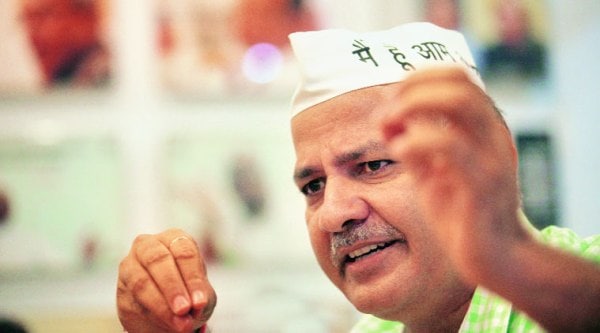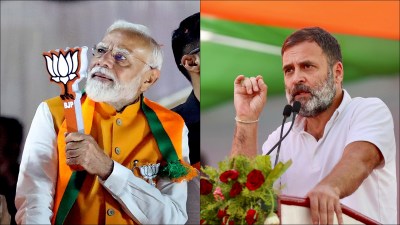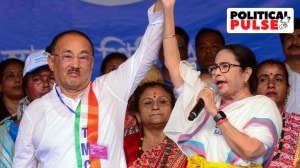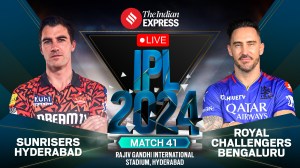- India
- International
We’ll bring Lokpal, but today people say they value power, water bills more: Manish Sisodia
In this Idea Exchange AAP leader Manish Sisodia talks about learning from the party’s past mistakes and perils of issues like ‘love jihad’
 AAP leader Manish Sisodia says Congress is cause of the problems which they want to change.
AAP leader Manish Sisodia says Congress is cause of the problems which they want to change.
In this Idea Exchange moderated by City Editor (Delhi) Apurva, senior AAP leader Manish Sisodia talks about learning from the party’s past mistakes, their plans for Delhi, AAP’s ‘ambivalent’ stand on communalism and perils of issues like ‘love jihad’
Apurva: You had grand plans for the Lok Sabha elections and you fought on many seats, but in the end, you won just four. Now you have decided not to contest any of the Assembly elections, but your local units have been demanding that you fight. What are AAP’s plans?
There were no ‘grand plans’. We knew from day one that we are not in for a majority in the Lok Sabha. We were not prepared, we did not have an organisation of that sort. Our candidates had very little time to prepare for the elections. We were under no illusion that we would win many seats or that (Arvind) Kejriwal would be prime minister. We had a few options. The first was to fight from a few high-profile seats to challenge the ministers who we were campaigning against. The second plan was that we should fight from 50 seats held by tainted politicians. But we thought we should bring in people who are in the periphery of the party — Kanchan Chaudhary Bhattacharya, Sarah Joseph, Medha Patekar, to name a few. There were many such well-wishers, but none of them was in the party’s nucleus. I was part of the candidate selection committee and I wanted to bring in such people into the party’s nucleus. Where we went wrong is that we thought that after we resign, elections would be announced along with the Lok Sabha polls and we would come back with a majority. We had no gampeplan.
Dipankar Ghose: You were saying that you were okay with getting a few seats in the Lok Sabha elections because your main aim was to spread your organisation. So, why not do it for the Assembly elections too?
We gained a lot of experience from fighting the Lok Sabha elections. It is not necessary that we contest every election that comes our way. Politics is not limited to fighting elections. Delhi was important for us even then. Had we got 36 seats, we would have crossed our first step. Now, we are still on that first step and we need to strengthen that.

Coomi Kapoor: What do you think of Sheila Dikshit’s comments regarding the BJP forming the government in Delhi?
It was a surprise for us. Dikshit is not a novice Congress leader. She knows what she is saying. Where did the comment come from, only she can tell. We have said that we do not have any problem if the Congress and BJP form the government. There is something cooking between the two. All we want is that if they are supporting each other, they should come out in the open.
Rakesh Sinha: If elections happen and AAP does not get the numbers, will you take Congress support?
No, we have seen the Congress as our ally. For the systemic changes that we want in politics, the Congress will not support us. They are the cause of the problems we want to change.
Dipankar Ghose: You always said that you wanted elections, but at one point, you went to the Lt Governor to work out the possibility of forming the government. What happened then? Were you not thinking of taking support from the Congress then?
We were shocked that we did not get any seat (in Delhi) in the Lok Sabha. We were expecting 4-5 seats. The volunteers too raised questions. We won only in Punjab. When we returned to Delhi, people started asking us why we weren’t forming the government. Arvind and I were visiting a colony, where this man told us that we should form the government again. We told him how could we when no one is supporting Lokpal. He said something interesting. He said life does not run on Lokpal Bill but on electricity bills. He told us that we cut down electricity rates when we were in power and that is what Delhi needs. So we thought of asking people again.
Apurva: Does this mean you were ready to give up on Lokpal?
No, we will bring in Lokpal, but today, people are saying that electricity and water bills are more important to them. That is the kind of governance they want.
Rakesh Sinha: What is your view on the L-G’s current role?
Of all that the L-G has done, the letter he wrote to the President was the most shocking for us. In his letter, instead of expressing his opinion, he expressed his wish — that ‘I’ll be grateful if they are allowed this…’ — whatever the language was. He knows what the situation is. Our MLAs are filing complaints, saying that there have been attempts at horse-trading, attempts to threaten MLAs. When 27 MLAs are giving that in writing, he should consider that. But he hasn’t considered it at all. He could have apprised the President of the entire situation, and told him that on the one side is the largest party, and on the other, the Aam Aadmi Party’s 27 MLAs have come to me and said that these guys are trying to indulge in horse-trading and threaten them… We have written a letter to the President as well. The L-G didn’t consider our complaint at all. For us, that was shocking.
Rakesh Sinha: So are you saying that the L-G is doing the BJP’s bidding?
Obviously, this is not happening without the BJP’s ishara (signal). The BJP is the party at the Centre. Without the BJP’s knowledge, this can’t happen.
Prawesh Lama: In the last few months, have you or Mr Kejriwal or any other senior member of the party tried to convince Shazia Ilmi to join the party again? Is she still a member of the party?
We had decided at one of the meetings that Anjali Damania would contact her, and she did get in touch with her. Then, (Ilmi) didn’t express a wish to join back.
Aditi Vatsa: Apart from your recent sting operation that featured the BJP’s Sher Singh Dagar and AAP’s Dinesh Mohaniya, have you conducted more sting operations?
Yes, we have certain recordings. They tried to contact around 15 of our MLAs, of which three or four, they were quite sure, would break away… One of them must have been Dinesh Mohaniya.
Vandita Mishra: There have been voices within and outside AAP that there is a personality cult around Arvind Kejriwal in your party. Some people try to rationalise it, saying that the responsibility is not on Kejriwal and that people of the party have given him a special place. As a party, do you consider this as a challenge, and if you do, what are you doing about it?
I don’t know about other parties, but in AAP, there is a thing called leadership and there is a thing called position, meaning responsibilities, what we call padd. Whether I’m suitable for my padd or Arvind Kejriwal is suitable for the convenor’s designation, people can raise questions about that. Often, we ourselves feel that we are inexperienced. As a spokesperson, sometimes, I wonder if I am doing what a spokesperson should be doing. When we talk about leadership, I feel Arvind Kejriwal is a well-accepted leader. But no party can rely on one single personality. The idea should be bigger than the personality. We have the idea — to bring about systemic changes. The more we stay true to that idea, the better it is. And for that, we are ready to do whatever is needed.
Naveed Iqbal: There’s a level of mistrust among people since Kejriwal’s resignation as chief minister. Why should people trust you again with governance?
Maybe there is mistrust, but there is also a lot of apnapan. Whenever people talk to us, they say, ‘you did wrong, but don’t do it again… you shouldn’t have done that’. There is sadness that a good man had come and he left.
Prawesh Lama: What would you say about Somnath Bharti’s midnight raid, and the way AAP handled the controversy around it?
Before I became an MLA, I was a social activist, and before that, a journalist. Where I live, people think that since you are a journalist, you’ll deal with the police, the power company, the water board guys… If the resident tells a journalist, ‘Look, there’s this gadbad and the police are colluding with them’, the journalist — if he’s thinking about more than just his job and his salary — he’ll act on it. I used to do that, and people expected me to do that. But as in the Khirki Extension case, if the police don’t act to stop what is happening right in front of them, it is normal for a hot debate to come up. But the controversy became huge, and a lot of politics happened around it. I really appreciate Somnath Bharti that when residents approached him for help, he didn’t say, ‘it’s night, please go back’. He listened, he went and tried to sort out things. He tried to tell the police that something was happening there.
Dipankar Ghose: You said that after the Somnath Bharti incident, there was a lot of politics. But most of that politics was by AAP — the dharna outside Rail Bhavan, Kejriwal sleeping on the streets, etc. A lot of people like Shazia Ilmi have also said that this kind of agitational politics is a problem. Do you look back and say that maybe we shouldn’t have gone that far?
Again, like I said, we aren’t very thick-skinned people or veterans at this. It is possible that what happened was wrong. But if something like this happens, we aren’t going to tell people that it is midnight, the MLA will not step out of his house. We won’t say it in the future either. How will we handle it? It is possible we will handle it better. It is easy to say that we will get the Delhi Police under the control of the state, that we will get Delhi full statehood. They have been roaming around with papers (on this) for the last 20 years. That is not how Delhi will become a complete state.
Rajgopal SINGH*: You said your party is different from other parties, that you will bring swaraj. But after the Lok Sabha elections, amidst the criticism your party was receiving, Arvind Kejriwal said one needs a high command in a party, without a high command one cannot run such a big party.
Swaraj does not mean the party will not have a boss or that no one will give orders in the party. Decision-making should be after talking to everybody, but once you decide on a boss and a team, you cannot go back every time and ask the boss, ‘We have fired 10 shots, should we fire 10 more?’.
Pavan Burugular*: When you were in government, you ran the state in your agitational style. If you come back to power, will we see any change in that?
See, these are just words. You call it agitation, I call it activism. The crux is that if you understand people’s problems, if you feel their pain, you will want instant solutions… Now, whether you bring these amenities by activism or agitation, or in Shiela Dikshit’s style or in Jagdish Mukhi’s style, whatever you call it, the point is, people need drinking water.
Rakesh Sinha: What is AAP’s stand on what some in the BJP describe as ‘love jihad’?
I have a lot of friends who are married to people of different religions, and they are leading great lives. So when I see this phrase and look at them, I feel a little sad, because this is what society really is. Look at where we are taking society for the sake of politics. We have created boundaries in politics, at various other places. Now even in such a personal space as marriage, we are creating boundaries. If we continue to do such things, it will be a grave injustice to future generations.
Vandita Mishra: On the issue of communalism, AAP’s position has been very ambivalent and ambiguous. Even earlier, before the formation of the NDA government, when you targeted Narendra Modi, it was on corruption.
We have been fighting against communalism for ages, and if we fight it using the paradigm of communalism, we can never win, because the forces that trigger this are more powerful and far more deeply involved in these activities. So there is only one solution, change the paradigm of the fight. Frankly speaking, why do people get communal, why should X or Y elements in a party want to do communal politics? Because they want to indulge in corruption. Their own marriages will work fine, marriages of people in their party will work fine, and businesses of people in their party will work with people from all communities. A Hindu businessman who engages in communal politics will never think I will not give supplies to people in Muslim areas, a Muslim politician engaging in such politics will never think he will never deal with a Hindu. Their lives will go on as per routine, but whenever it is about politics, they will bring in communalism. Why is it so? Because they feel such politics will bring them to power, from where they can indulge in corruption. Ultimately, if you bring this problem to the core paradigm of politics, we can solve this. This is where we want to stand and fight.
Coomi Kapoor: Why do you think you only won four seats in the Lok Sabha elections, and all of them in Punjab? Besides, in the recent by-elections there, AAP lost its deposit in Punjab as well.
We were not ready for the entire country. In Punjab, we won because the people of the state saw us as a better alternative to the Congress, Akali Dal or BJP. We also had good candidates and partymen worked a lot. As for the by-elections, even in the Lok Sabha polls, we had lost those seats. Both the seats were prestige seats — one for Amarinder Singh and another for the Akali Dal… These are just answers I have, there could be any number of reasons.
Kaunain Sheriff M: You had brought in a lot of big names, such as V Balakrishnan in Bangalore and Meera Sanyal in Mumbai. What is happening with these leaders now? We see only three leaders at the national level now — you, Arvind Kejriwal and Prashant Bhushan.
Of the 416 candidates — if I give you a rough calculation — I always thought 100-150 would not be so involved with the party in the long run, another 100 would be those who are already involved with the party from before. So my whole focus was on the remaining 150-200 people. They are working for the party at various district levels and in state units. They are in various committees.
Dipankar Ghose: When you came from the India Against Corruption movement, all of you said you were extremely idealistic about swaraj and Lokpal and things like that. Now you get caught in questions like why did you take the Congress’s support, why did you resign from the government… Do you ever look back in retrospect and say we should not have formed a government without those 36 MLAs in the first place? That we lost a little bit of moral high ground there?
There is no you use in that. You can keep looking back. But if you keep looking back, more in the rear glass, accidents can happen. The front glass is always bigger than the rear glass in cars. So it is important to look back, but only to the extent that is necessary. It is important to look ahead, we have to move forward.
* EXIMS students Transcribed by Pragya Kaushika, Pritha Chatterjee & Shikha Sharma
Apr 25: Latest News
- 01
- 02
- 03
- 04
- 05































